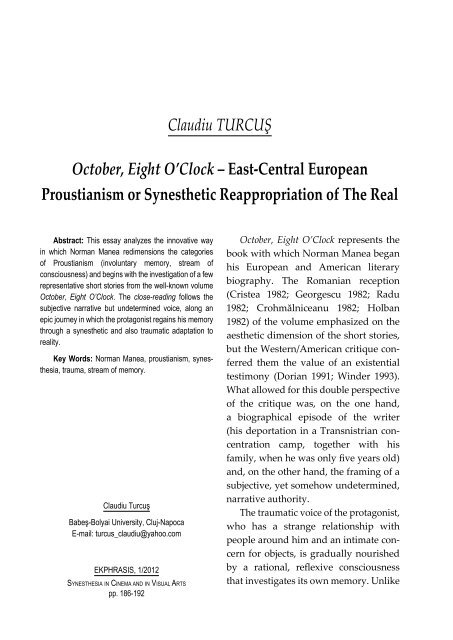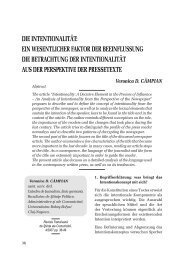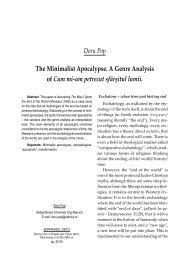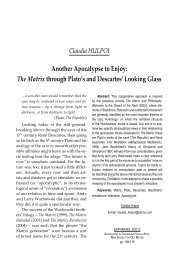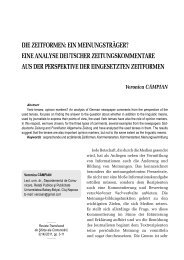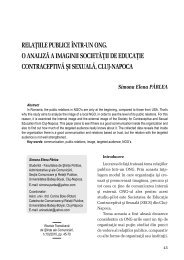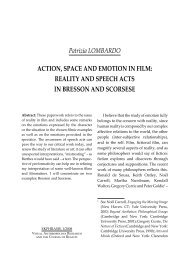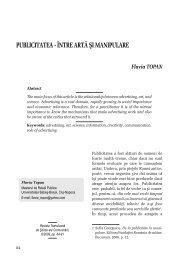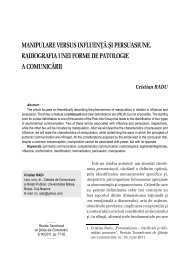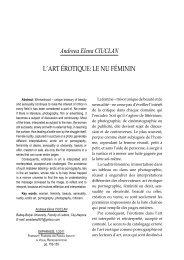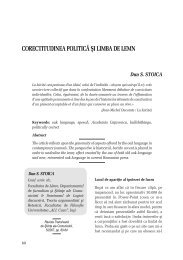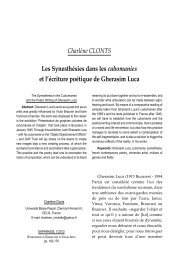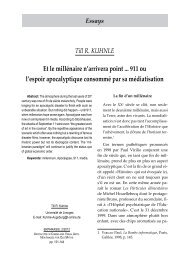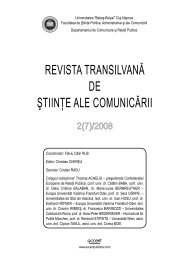East-Central European Proustianism or Synesthetic ... - Ekphrasis
East-Central European Proustianism or Synesthetic ... - Ekphrasis
East-Central European Proustianism or Synesthetic ... - Ekphrasis
Create successful ePaper yourself
Turn your PDF publications into a flip-book with our unique Google optimized e-Paper software.
186 Claudiu TURCUŞ<br />
Claudiu TURCUŞ<br />
October, Eight O’Clock – <strong>East</strong>-<strong>Central</strong> <strong>European</strong><br />
<strong>Proustianism</strong> <strong>or</strong> <strong>Synesthetic</strong> Reappropriation of The Real<br />
Abstract: This essay analyzes the innovative way<br />
in which N<strong>or</strong>man Manea redimensions the categ<strong>or</strong>ies<br />
of <strong>Proustianism</strong> (involuntary mem<strong>or</strong>y, stream of<br />
consciousness) and begins with the investigation of a few<br />
representative sh<strong>or</strong>t st<strong>or</strong>ies from the well-known volume<br />
October, Eight O’Clock. The close-reading follows the<br />
subjective narrative but undetermined voice, along an<br />
epic journey in which the protagonist regains his mem<strong>or</strong>y<br />
through a synesthetic and also traumatic adaptation to<br />
reality.<br />
Key W<strong>or</strong>ds: N<strong>or</strong>man Manea, proustianism, synesthesia,<br />
trauma, stream of mem<strong>or</strong>y.<br />
Claudiu Turcuş<br />
Babeş-Bolyai University, Cluj-Napoca<br />
E-mail: turcus_claudiu@yahoo.com<br />
EKPHRASIS, 1/2012<br />
SYNESTHESIA IN CINEMA AND IN VISUAL ARTS<br />
pp. 186-192<br />
October, Eight O’Clock represents the<br />
book with which N<strong>or</strong>man Manea began<br />
his <strong>European</strong> and American literary<br />
biography. The Romanian reception<br />
(Cristea 1982; Ge<strong>or</strong>gescu 1982; Radu<br />
1982; Crohmălniceanu 1982; Holban<br />
1982) of the volume emphasized on the<br />
aesthetic dimension of the sh<strong>or</strong>t st<strong>or</strong>ies,<br />
but the Western/American critique conferred<br />
them the value of an existential<br />
testimony (D<strong>or</strong>ian 1991; Winder 1993).<br />
What allowed f<strong>or</strong> this double perspective<br />
of the critique was, on the one hand,<br />
a biographical episode of the writer<br />
(his dep<strong>or</strong>tation in a Transnistrian concentration<br />
camp, together with his<br />
family, when he was only five years old)<br />
and, on the other hand, the framing of a<br />
subjective, yet somehow undetermined,<br />
narrative auth<strong>or</strong>ity.<br />
The traumatic voice of the protagonist,<br />
who has a strange relationship with<br />
people around him and an intimate concern<br />
f<strong>or</strong> objects, is gradually nourished<br />
by a rational, reflexive consciousness<br />
that investigates its own mem<strong>or</strong>y. Unlike
October, Eight O’Clock – <strong>East</strong>-<strong>Central</strong> <strong>European</strong> <strong>Proustianism</strong><br />
<strong>or</strong> <strong>Synesthetic</strong> Reappropriation of The Real<br />
187<br />
Benjy, the retarded adolescent and<br />
Faulkner’s narrat<strong>or</strong> of the first part of<br />
The Sound and The Fury, the mind of the<br />
aged child from October, Eight O’Clock<br />
acquires a reasoning power towards<br />
the great happenings he had lived. It is<br />
an unconventional and unpredictable<br />
endeavour to which the reader must<br />
subdue himself and which helped John<br />
Bayley in decoding the way to the center<br />
of these sh<strong>or</strong>t st<strong>or</strong>ies: “We grasp what<br />
is going on by a species of intuition<br />
that seems to relate both to our own<br />
experience and to one that is hardly<br />
imaginable: the paradox and opposition<br />
involved constituting a remarkable feat”<br />
(Bayley 1992). Delineating the poetics<br />
of reception, the English intellectual<br />
observes that the changing subjectivity,<br />
specific f<strong>or</strong> the narrative auth<strong>or</strong>ity,<br />
involves the readership alterity:<br />
“Certainly the power of his writing<br />
appears undiminished by the effect of the<br />
indeterminacy it can sometimes produce.<br />
That goes with the sense of a twilit of<br />
purgat<strong>or</strong>ial existence, in which the most<br />
obvious features of tyranny and suffering<br />
have become metam<strong>or</strong>phosed into their<br />
personal equivalents. Mr. Manea is the<br />
most subjective of the sufferers, but just<br />
f<strong>or</strong> the reason he can involve us totally in<br />
his own awareness of it and the images<br />
of it that live in his narrative” (Bayley<br />
1992). In a relative contrast, f<strong>or</strong> Richard<br />
Burghin, October, Eight O’Clock represents<br />
an emotional visionary trance from which<br />
a contradict<strong>or</strong>y humanity is conceived,<br />
“[…] at once intensely autobiografical and<br />
curiously impersonal” (Burghin 1992).<br />
The effect of impersonalizing the<br />
biography, without the subjectivity of<br />
the perspective to be compromised,<br />
but only undetermined, denotes a<br />
reconsideration of the mechanisms of<br />
authenticity. The refusal of the cliches<br />
that could ennoble the atrophy of the<br />
human and the complex understanding<br />
of guilt, both increased by an obvious<br />
literary consciousness, situates Manea’s<br />
sh<strong>or</strong>t st<strong>or</strong>ies in a general side of art 1 . At<br />
the advice of the sceptic Samuel Beckett<br />
(“There is nothing to express, nothing<br />
with which to express, nothing from<br />
which to express, no power to express,<br />
together with the obligation to express”),<br />
N<strong>or</strong>man Manea decided to bear a much<br />
m<strong>or</strong>e difficult commitment (Begley 1992).<br />
A potential novel (Ge<strong>or</strong>gescu 1982;<br />
D<strong>or</strong>ian 1991) of the preservation of humanity,<br />
October, Eight O’Clock delineates<br />
the poetics of an infra-limit. Filtered<br />
by a psychology with seismographic<br />
sensitivity, the ruined universe is always<br />
hiding something fatal. Nothing happens<br />
on the surface, everything smolders to<br />
the final destruction. It is a secret panic,<br />
nourished by the anticipation of danger,<br />
in which Lucian Raicu identified the<br />
center of Manea’s prose complexity: “a<br />
writer of crucial moments, deadlocks,<br />
1 It is exactly what the Jewish participant to<br />
a Berlin public reading didn’t understand<br />
<strong>or</strong> couldn’t accept, in October, Eight O’Clock.<br />
The revealing seemed to him too ambiguous,<br />
irrelevant f<strong>or</strong> the atrocities of the Holocaust,<br />
almost a mystification. What he<br />
wanted was the denouncing of the culpable<br />
ones, the truth.
188 Claudiu TURCUŞ<br />
disequilibrium and crisis situations, but<br />
all of these being inapparent I must add,<br />
difficult to be reasoned with a so-called<br />
n<strong>or</strong>mal perception, shown out of the blue,<br />
disturbing and affecting things that a<br />
rather imperturbable and less demanding<br />
consciousness would never consider as<br />
being out of the <strong>or</strong>dinary” (Raicu 1984).<br />
Here is the beginning of the powerful<br />
st<strong>or</strong>y The Sweater:<br />
She would leave every Monday and<br />
return every Friday. Each time in tears,<br />
as though she were saying good-bye f<strong>or</strong><br />
the last time. Next time she might not<br />
find the strenght to go – so much could<br />
happen in a week. A miracle, and she<br />
wouldn’t need to leave, to be separated<br />
from us. The sky might suddenly open<br />
and we might find ourselves in a real<br />
train, not like the cattle cars they had<br />
unloaded us from in this emptiness<br />
at the end of the w<strong>or</strong>ld. It would be a<br />
warm, brightly lit train with soft seats…<br />
kind, gentle ladies would serve us<br />
our fav<strong>or</strong>ite foods, as befits travelers<br />
returning from the other w<strong>or</strong>ld. Or,<br />
perhaps, even bef<strong>or</strong>e Friday, the day<br />
she was due back, this endless ashen<br />
she would come crashing down to<br />
swallow us <strong>or</strong> redeem us, this sky that<br />
we awaited to enter once and f<strong>or</strong> all, so<br />
that everything might come to an end.<br />
(Manea 1992: 3)<br />
A mother who bears too many responsibilities<br />
by herself asks the guards<br />
every single week to allow her to look f<strong>or</strong><br />
obscure jobs outside the concentration<br />
camp, in the villages of the Ukrainian<br />
steppe. Every Friday is a new beginning,<br />
the ritual of the six piles of food (the<br />
potatoes, the beans, the flour, sometimes<br />
the cheese, the dried plums, the apples),<br />
carefully arranged, being a s<strong>or</strong>t of<br />
equivalent of delaying the final sentence.<br />
Unlike the hopeless father, the woman<br />
still believes that a better w<strong>or</strong>ld is waiting<br />
f<strong>or</strong> them outside. Her faith attains the<br />
features of the desperate wish to survive.<br />
Her concerns are not the elab<strong>or</strong>ation<br />
of a geography of the Heaven <strong>or</strong> the<br />
celebration of the imm<strong>or</strong>tal soul, but the<br />
self sacrifice f<strong>or</strong> the ones she loves. The<br />
mem<strong>or</strong>y of a God who rescued His people<br />
from the Egyptian slavery, guiding it<br />
through the Canaan desert, leads to her<br />
terrestrial representation of the Last Day.<br />
Meaning a day of Bef<strong>or</strong>e, with plenty of<br />
food and clean clothing. The ruins of the<br />
apocalyptic time described by N<strong>or</strong>man<br />
Manea contain both the signs of extinction<br />
and the hope of salvation. But opposed to<br />
the biblical image of the open sky which<br />
reveals the gl<strong>or</strong>y of an Almighty Yahweh<br />
<strong>or</strong> which spread the rage of the same<br />
divinity over the sinful mankind, in The<br />
Sweater the eschatology and soteriology<br />
are placed on the h<strong>or</strong>izontal. The trains<br />
take the people to death, as other trains<br />
infinitely m<strong>or</strong>e comf<strong>or</strong>table could rest<strong>or</strong>e<br />
their humanity. And in such a dystopian<br />
reality, a shabby sweater, made from<br />
fabric scraps and taken from the bottom<br />
of the food bag, brings the revelation:<br />
“She had not had the chance to unfold<br />
it so that we could see it whole, but that<br />
did not matter: clearly it was real. Even<br />
our rescue now seemed closer, <strong>or</strong> at least<br />
possible, since we had been granted the
October, Eight O’Clock – <strong>East</strong>-<strong>Central</strong> <strong>European</strong> <strong>Proustianism</strong><br />
<strong>or</strong> <strong>Synesthetic</strong> Reappropriation of The Real<br />
189<br />
sight and touch of such a miracle” (Manea<br />
1992: 5). The humble clothing epiphany<br />
triggers an entire scenario of identifying<br />
the future owner, the introverted child<br />
secretly wishing to be the lucky one.<br />
But he is very disappointed when his<br />
mother, smiling <strong>or</strong> crying, tells them<br />
that the sweater is f<strong>or</strong> Mara, a Christian<br />
girl, who got there by an administrative<br />
mistake. An authentic and strong child<br />
malice invades the narrat<strong>or</strong>’s mind. While<br />
at first being a protegee, the girl sh<strong>or</strong>tly<br />
becomes a hatable rival who received a<br />
gift that was meant only f<strong>or</strong> him: “I could<br />
not point out to her that it was too big<br />
f<strong>or</strong> her, that it had a boy’s crew neck.<br />
She could have seen that f<strong>or</strong> herself,<br />
after all – she was old enough – but to<br />
do that she would have had to take it off<br />
occasinally and look at it.“ (Manea 1992:<br />
7). But Mara does not have the chance<br />
to enjoy her fluffy and varicol<strong>or</strong>ed gift<br />
because she dies of poverty and hunger.<br />
And tragedies, unf<strong>or</strong>tunately, do not<br />
ameli<strong>or</strong>ate misery: “When they were<br />
ready to carry the coffin out of the house,<br />
Father reached over with his big hand,<br />
felt around, found it, pulled it to one<br />
side, and let it fall behind him. Mother<br />
saw; she looked at him f<strong>or</strong> a long time,<br />
but said nothing: she accepted that it be<br />
saved” (Manea 1992: 9). From envy, the<br />
protagonist now feels rem<strong>or</strong>se, taking<br />
upon himself a nonexistent guilt that will<br />
later bring him to delirium.<br />
This syndrome of fatality is reiterated<br />
in Death, when the boy convulsively<br />
imagines that the needle of the bee that<br />
stung him was a real bullet, <strong>or</strong> in Seascape<br />
with Birds, where a few squashed black<br />
currants are hallucinat<strong>or</strong>y thought to be<br />
the blood from a deep wound. In We might<br />
have been Four, the threatening of death<br />
amplifies the fear of a family gathered<br />
f<strong>or</strong> an unusual feast. The catch of a hen<br />
and its sacrifice, the panicked hiding of its<br />
internal <strong>or</strong>gans and its feathers indicate<br />
the behaviour of a banished beast, veiled<br />
by a permanent silent and autosuggestive<br />
hope. “[We] were stronger than the dogs,<br />
the guards, the unif<strong>or</strong>ms, the hunger, the<br />
lice, the bullets, the f<strong>or</strong>est, and the base<br />
temptation of the meat of a stolen fowl”<br />
(Manea 1992: 23).<br />
Escaping from punishment in real life,<br />
the child founds his peace in the arms of<br />
the mother. From now on, the sweater<br />
is solely his. The innocent cruelty of<br />
possession had taken control over him.<br />
But still, the revelation shades away,<br />
like in The Balls of Faded Yarn whose<br />
disappointing metam<strong>or</strong>phosis in gloves,<br />
mufflers <strong>or</strong> sleeves meets the child’s<br />
rejection. Drained of all its emotional<br />
attraction, the sweater loses its glow,<br />
remaining only a safety bearer, a m<strong>or</strong>e<br />
and m<strong>or</strong>e col<strong>or</strong>less and adapted servant:<br />
But I did not wear it to the doct<strong>or</strong>’s<br />
burial; that would have been too much.<br />
It was during a terrible snowst<strong>or</strong>m, and<br />
I shook with fear and bitter cold. I had<br />
hidden it well so no one would find it. I<br />
f<strong>or</strong>got about it f<strong>or</strong> quite a few days and<br />
set it free only much later, when the<br />
burials had multiplied to several every<br />
day. There was no reprieve anywhere,<br />
there was no avoiding. They died by<br />
the dozens; the curse fell at random,
190 Claudiu TURCUŞ<br />
precisely on those who least expected it.<br />
They no longer had time f<strong>or</strong> me, n<strong>or</strong> I f<strong>or</strong><br />
myself; the terr<strong>or</strong> had become universal,<br />
beyond measure, had swallowed us all.<br />
(Manea 1992: 15)<br />
The image of a humanity disturbed<br />
by the curse of death brings a kind<br />
of deliberate penitence of the child<br />
who considers now that comf<strong>or</strong>t is<br />
inadequate f<strong>or</strong> sad moments. Only when<br />
death transf<strong>or</strong>ms itself into an almost<br />
insignificant thing, he considers it is not<br />
w<strong>or</strong>th standing the cold anym<strong>or</strong>e, and<br />
even guilt <strong>or</strong> malice, essential “virtues” in<br />
better times, start losing their consistency.<br />
The lucidity of catastrophe balances the<br />
perception of reality: the fabulous piece<br />
of clothing becomes again what it used<br />
to be since ever – just a sweater. Because<br />
only the tyranny of affection combined<br />
with a precarious existence made the boy<br />
consider the sweater as having a magical<br />
aura.<br />
As we find out from the sh<strong>or</strong>t st<strong>or</strong>y<br />
ironically called Proust’s Tea, “there are,<br />
then, certain gifts whose only quality<br />
and only flaw is that they cannot be<br />
exchanged f<strong>or</strong> anything else” (Manea<br />
1992: 41). The shabby sweater, together<br />
with the lye soap <strong>or</strong> the crackers having<br />
the unique taste of hunger, redimension<br />
life, the human being integrating the<br />
objects/food in a circuit of n<strong>or</strong>mal<br />
living. Surviving means cultivating insignificant<br />
mystifications through which<br />
the individual can reconnect to a natural<br />
past otherwise unreachable. But sometimes<br />
psychological tricks surrender<br />
under physical auth<strong>or</strong>ity. Taken by<br />
surprise by the narrat<strong>or</strong> while g<strong>or</strong>ging<br />
with crackers and tea offered by the<br />
Red Cross nurses, “a little midget who<br />
inspired tenderness” (Manea 1992: 38),<br />
being in a train station with his mother<br />
and other ill-fated people returned from<br />
the concentration camp, illustrates the<br />
impasse of the surviving mechanism.<br />
Being struck with consternation, the<br />
Proustian scheme of involuntary mem<strong>or</strong>y<br />
does not yield results, “the aroma<br />
of that heavenly drink could not be<br />
reminiscent of anything; he had never<br />
experienced such pleasure (Manea 1992:<br />
38). Hunger eroded the function of<br />
taste, generating the breakdown of the<br />
sensitivity infrastructure. The fairy w<strong>or</strong>ld<br />
in which Proust’s protagonist enters<br />
when dipping a madeleine in a lime tea<br />
cannot be reclaimed anym<strong>or</strong>e, and bef<strong>or</strong>e<br />
reinventing it mentally the boy must<br />
f<strong>or</strong>get the terrifying episodes of his own<br />
childhood.<br />
And if the heady sensation cannot<br />
revive the past, the behest of mem<strong>or</strong>y<br />
will do it in obedience to the Jewish<br />
tradition. The narrat<strong>or</strong> takes advantage<br />
of the petrified boy who lifts his eyes up<br />
to the ceiling of the train station, a dirty<br />
stone sky, and hence bringing in front the<br />
ritual of preserving the humanity found<br />
in a process of alteration:<br />
High up on the arched ceiling of the<br />
waiting room, where the light bulbs<br />
attracted billows of insects, Grandfather<br />
appeard as if on a round screen, and<br />
Grandmother, and his parents, and<br />
his aunt. They were warming their<br />
hands on the steaming cups, all of them
October, Eight O’Clock – <strong>East</strong>-<strong>Central</strong> <strong>European</strong> <strong>Proustianism</strong><br />
<strong>or</strong> <strong>Synesthetic</strong> Reappropriation of The Real<br />
191<br />
starting at the same point high above,<br />
in front of them. [...] Grandfather did<br />
not take his eyes off the little white<br />
cube of sugar that hung, as usual, from<br />
the ceiling lamp. They all had to stare<br />
at it intensely f<strong>or</strong> some minutes bef<strong>or</strong>e<br />
sipping the hot water. Those who<br />
remembered the taste of sugar, those,<br />
that is, who had had the time, bef<strong>or</strong>e<br />
the disaster, to accustom their palates to<br />
the sweetness of the little white lumps,<br />
gradually felt their lips become wet and<br />
sticky. The brackish green drink become<br />
sweet, good, “real tea”, as Grandfather<br />
would say. [...] Then everyone raised his<br />
eyes toward the lamp from which a tiny<br />
parallelipiped of almost-white sugar<br />
hung on a string. They had to stare at<br />
it patiently f<strong>or</strong> a long time, and had to<br />
sip the tea slowly, until everyone felt<br />
his lips, tongue, mouth, his entire being<br />
refreshed, mellowed by the mem<strong>or</strong>y of<br />
a w<strong>or</strong>ld they must not give up, because,<br />
Grandfather firmly believed, it had not<br />
given them up and could not do without<br />
them. [...] Up there, above the din in<br />
which the po<strong>or</strong> wretches tried, uselessly,<br />
to return to another life, up there, in<br />
an open space, isolated from the huge<br />
waiting room, Grandfather, confident in<br />
a return that would not come to pass,<br />
could have assured them that the magic<br />
potion was indeed proof that the w<strong>or</strong>ld<br />
had welcomed them back. But even this<br />
strange drink did not remotely resemble<br />
“real tea”. (Manea 1992: 30-40)<br />
The analepsis implicitly leads to<br />
the well-known episode from the Old<br />
Testament where Moses, at the command<br />
of God, makes a snake of copper that will<br />
heal any man bitten by a real snake, if he<br />
beholds the brass figure. The context is<br />
represented by the conflict between God<br />
and the People of Israel, discontented<br />
with the rough desert. Both cynical<br />
and compassionate, Yahweh plans a<br />
punishment symbolically consubstantial<br />
with the rescue. Like the brass snake,<br />
which had to remind the chosen rebels<br />
about the infallible attributes of God, the<br />
small piece of sugar hung by the lamp<br />
represents the guarantee f<strong>or</strong> another<br />
reality, one that is w<strong>or</strong>th living f<strong>or</strong>. When<br />
any springs of humanity are threatened,<br />
the reclaiming of a lost taste acquires the<br />
significance of a crucial stage in saving<br />
one’s own existence.<br />
Representing a step f<strong>or</strong>ward as compared<br />
to the expl<strong>or</strong>ation of a peaceless<br />
self from The Sweater, where the child,<br />
witnessing unannounced deaths, is<br />
waiting f<strong>or</strong> the tragic finale, Proust’s<br />
Tea describes the traumatic p<strong>or</strong>trait of<br />
the first years of living only after the<br />
recovering of sensitivity and, of course,<br />
of the necessary distance f<strong>or</strong> autoscopy:<br />
“If, later, I lost anything, it was precisely<br />
the cruelty of indifference. But only later;<br />
and with difficulty. Because, much later,<br />
I became what is called … a feeling being<br />
(Manea 1992: 41).<br />
In a discussion about October, Eight<br />
O’Clock, Manea says that he tried to<br />
imagine Proust in Transnistria. Except<br />
that now, the grandfather’s ritual and<br />
the mother’s protection are no longer<br />
touching, but they represent desperate<br />
eff<strong>or</strong>ts to simulate the altered sen-
192 Claudiu TURCUŞ<br />
sitivity. The diminished interi<strong>or</strong>ity exposes<br />
perhaps the signs of abasement,<br />
the contrast between n<strong>or</strong>mality and<br />
downfall. In The Balls of Faded Yarn, the<br />
child is bewildered by the intensity of the<br />
col<strong>or</strong>s: the mosaic that he amazedly and<br />
ceaselessly contemplates, until his dirty<br />
nails begin to pierce his skin; the windows<br />
covered with a blue paper that dispreads<br />
a fluid and suffocating quietness. The<br />
old and now so heavy universe becomes<br />
unbearable f<strong>or</strong> the reclusive child and<br />
the other children’s hostility is easier to<br />
suffer than the blinding concreteness of<br />
the real. Only the magic of imagination<br />
conciliates between the sound of w<strong>or</strong>ds<br />
and the stupefying shape of the beholded<br />
objects. The w<strong>or</strong>ld known bef<strong>or</strong>e dep<strong>or</strong>tation,<br />
completely erased from the<br />
mem<strong>or</strong>y when living the ruined reality<br />
of the concentration camp, and the w<strong>or</strong>ld<br />
known never bef<strong>or</strong>e by the child grown<br />
up ahead of time are synesthetically (re)<br />
appropriated bef<strong>or</strong>e being socially (re)<br />
expl<strong>or</strong>ed.<br />
Bibliography<br />
Begley Louis, “A Matter of Survival”, in The New Y<strong>or</strong>k Review of Books, September 24, 1992.<br />
Burghin Richard, “The St<strong>or</strong>ies and Essays of a Romanian Exile”, in The Washington Post, May<br />
17, 1992.<br />
Bayley John, “Treading the Edge of Nightmare”, in The New Y<strong>or</strong>k Times, June 21, 1992.<br />
Cristea Valeriu, “Octombrie, <strong>or</strong>a opt”/“October, Eight O’Clock”, in România literară, February<br />
18, 1982<br />
Crohmălniceanu Ov. S., “Inventivitate artistică funcţională”/“Functional Artistic Inventiveness”,<br />
in România literară, September 16, 1982.<br />
D<strong>or</strong>ian Marguerite, “Le thé de Proust”, in W<strong>or</strong>ld Literature Today, Summer, 1991.<br />
Ge<strong>or</strong>gescu Paul, “Imperativul intensităţii”/“The Imperative of Intensity”, in România liberă, no.<br />
8, February 20, 1982.<br />
Holban Ioan, “Pelicule, tablouri, clişee”/“Pellicles, Paintings, Cliches”, in Cronica, March 26, 1982.<br />
Radu Tania, “Realismul detaliului”/“The Realism of The Detail”, in Flacăra, June 4, 1982.<br />
Raicu Lucian, “O viziune complexă”/“A Complex Vision”, in România literară, no. 9, 1984.<br />
Manea N<strong>or</strong>man, October, Eight O’Clock, translated by C<strong>or</strong>nelia Golna & Anselm Hollo, New<br />
Y<strong>or</strong>k, Grove Press, 1992.<br />
Winder Robert, “When the Banned Played On”, in The Independent, May 28, 1993.


